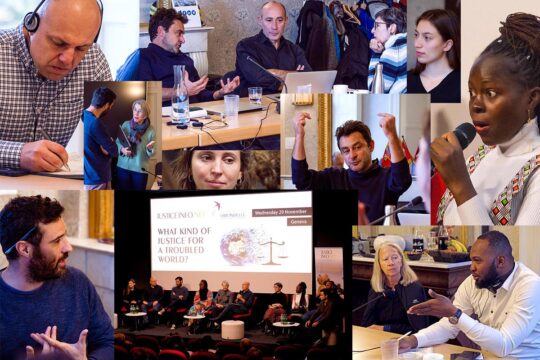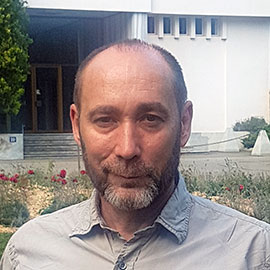When the Justice Info website was officially launched on June 17 2015, it was not at all Fondation Hirondelle’s first step into news and information on mass violence. In fact, this is in the DNA of the Fondation, a non-governmental organization created by a group of Swiss journalists 30 years ago in the wake of the Rwandan genocide. Their initiative was directly inspired by what happened in Rwanda. And this awareness has accompanied the NGO’s development ever since. Over almost 20 years, Fondation Hirondelle produced thousands of dispatches on the international and national trials against those responsible for the massacre of Tutsis in Rwanda.
Justice Info is the faithful, coherent extension of this tenacious commitment. The aim was now to extend coverage to the whole world and to any criminal or non-criminal justice initiative dealing with past or present international crimes.
Justice Info sees itself as the echo chamber of a global movement that began in the 1980s in Latin America, in the aftermath of military dictatorships, and which developed spectacularly in the 1990s and 2000s with the creation of a series of international tribunals – including for Rwanda, former Yugoslavia, East Timor, Kosovo, Sierra Leone and Cambodia - to deal with international crimes. This field has been defined by a term that is a little cold and obscure, but which has taken hold in the rights movement: transitional justice.
Justice Info at the heart of the coverage
Ten years on, the terms “war crime”, “crime against humanity” and “genocide” are making headlines every day in the mainstream media. Justice Info’s founders were convinced of the humanist and political relevance of aspirations for victims to know the truth, to see the perpetrators of crimes brought to justice and to obtain reparation, but they probably did not expect that this area of information would become so mainstream.
Today, Justice Info finds itself, by virtue of its subject, at the heart of the news coverage.
If Justice Info’s field of work is growing, it is sadly because major violence is also growing. It would be a shame to celebrate this. There is, however, a brighter and hopefully fairer of way of looking at things: if our coverage is expanding and finding itself so often at the heart of what is happening, it is because the aspiration for law and justice is spreading proportionately.
Times change, but the law remains
The world order that emerged from the Second World War is no more. International law, which was supposed to structure relations between nations since 1945, is regularly trampled on, including by major regional and global powers of which several permanent members of the United Nations Security Council. The development and legitimacy of international justice are strongly questioned or clearly rejected. The choice between war and peace has once again taken centre stage in world geopolitics.
But just as world disorder is accelerating, peoples and states are increasingly calling on the law to regulate violence and power relations. This is reflected, for example, in the intensity of their actions before two of the most eminent international tribunals: the International Court of Justice and the International Criminal Court. So, de facto, there continues to be law even where it seems there is none.
Initiatives to deal with the great upheavals of history remain numerous and creative. Transitional justice practices, developed over the last four decades, are inspiring many societies around the world. They are broadening the scope of application and reflection beyond war and dictatorship to include environmental crimes, climate change, corporate responsibility, the colonial past, sexual abuse in the Church, police violence and perhaps tomorrow gangs.
Justice Info has been following and illustrating this trend for the past ten years, through a network of specialist local journalists that is unique in the world, and thanks to contributions from experts asked to shed light on events that are often complex and technical, but which deserve to be understood by as many people as possible.
The universal and the particular
It’s hard to pick the highlights of these ten years. But they could include: the powerful trial of Hissène Habré before a court in Dakar; the spectacular truth commission in Gambia, which kept us on the edge of our seats for two years; the immensely ambitious process in Colombia, which will inevitably go down in the annals of transitional justice; and the wartime justice developed by Ukraine. There are also the surprising trials of “mobile” courts in the heart of Kasai or Kivu; the often timid response to the demand for colonial reparations; another major truth commission in Tunisia; the indictments of Vladimir Putin and Benyamin Netanyahu; the trial of Dadis Camara and others in Guinea; the recognition of crimes against indigenous peoples from America to Scandinavia; conviction of the last three great Khmer Rouge leaders in Cambodia; accusation of genocide against Burmese leaders; and Raji Sourani’s terrible warning that Gaza should not be the “graveyard of international law”.
Given the upheavals underway, our work finds itself at the crossroads of current geopolitical and legal protection issues, and aspirations for justice and peace. Justice Info is more than ever at the heart of the times. Its audience continues to grow, because its subject has become a burning concern. Our website aims to offer an expert and humble compass, responsive but not hasty, non-partisan and accessible to all, to shed light on current events and navigate them without losing our bearings, based on reliable facts, a solid framework for reading and analysis, rooted in reality and the long term, and a serene affirmation that the universal “rich in all particulars”, as Aimé Césaire put it, remains a noble horizon.
Thank you to all our correspondents and contributors for passionately nurturing the ambition to inform with independence, rigour and boldness. Thank you to our readers for your loyalty and support.







